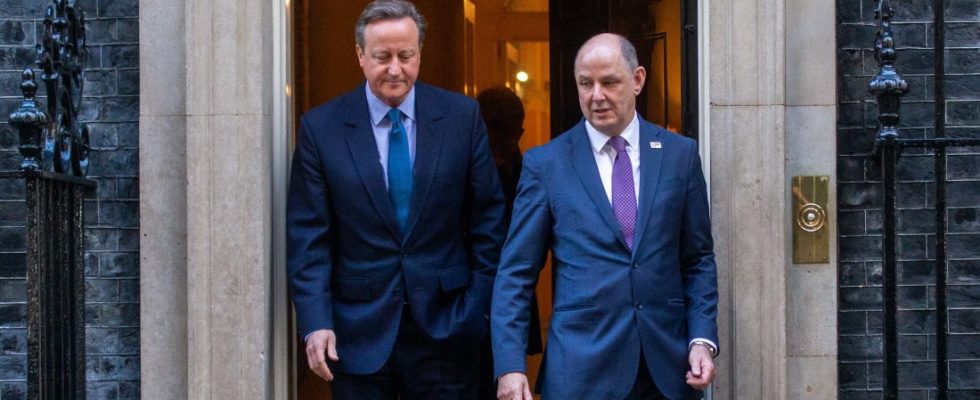When David Cameron appeared out of nowhere at Downing Street in London on Monday morning, he greeted the journalists with a curt “Morning”. It took a while for someone to ask Cameron if he would be foreign secretary, but by then he had almost disappeared behind the black door with the number ten. His appearance was so surprising, so sensational that some reporters couldn’t believe it: David Cameron, really?
In recent years we have seen many prime ministers come and go from Downing Street, but no one expected this: Former Prime Minister David Cameron is back – and will be Great Britain’s Foreign Secretary. Ironically, Cameron, who was responsible for the Brexit referendum in 2016. It was he who wanted to have the question of EU membership clarified once and for all and therefore let the population vote on whether to stay or leave. Cameron tried to secure his own power; he was convinced that nothing would happen. Things turned out differently: a narrow majority voted for Brexit – and thus ended his term in office.
Cameron should help Sunak catch up. The backlog is large
Cameron was Prime Minister from 2010 to 2016. Now, at 57, he will be Foreign Secretary under Rishi Sunak, a prime minister who, unlike Cameron, voted for Brexit. The two of them may not yet know exactly how this will fit together. In any case, Cameron sent out a statement after his appointment in which he referred to some differences of opinion: “Even though I disagreed with some individual decisions, it is clear to me that Rishi Sunak is a strong and capable Prime Minister in a difficult situation “It takes on an exemplary leadership role over time.” He, Cameron, wanted to help him and “be part of the strongest team that serves the United Kingdom and can be presented to the country in the general election.”
The election will take place in January 2025 at the latest, probably earlier. The Prime Minister decides when that happens. And he is far behind Labor in the polls. Since Sunak moved into 10 Downing Street just over a year ago, his Tories’ deficit has been a fairly constant 20 percent. Now Cameron should help him catch up. But the question that Sunak has to face first is: Why does he, who presents himself as a prime minister of change, bring someone into his cabinet who stands for a few things, but not for change?
Labor MP Pat McFadden sees it this way: “A few weeks ago Sunak said Cameron was part of the failed status quo, now he’s bringing him back as a lifeline. This is the Prime Minister’s ridiculous claim that after 13 years of failure the Tories wants to offer change is invalid.” The Tories have been in power for 13 years without interruption. For most of this time, Cameron ran the business in Downing Street.
He is now a peer for life
As far as foreign policy is concerned, apart from the Brexit referendum, what is particularly remembered is that Cameron, as prime minister, was not afraid to do business with Beijing. It remains to be seen whether he is still so China-friendly. What is at least certain is that the majority of Tory MPs have no interest in moving closer to the People’s Republic. Many people therefore view Cameron’s appointment with suspicion.
In his first statement as foreign secretary He said the UK would “stand with its allies” and “ensure our voice is heard” on challenges from the Middle East to Ukraine. That’s the sound of someone who doesn’t lack self-confidence. One can assume that Cameron knows how to use his new role to his advantage. Even though, as he says, he has “not been at the forefront of politics” in recent years, he hopes that his experience will help him: “I was leader of the Conservatives for eleven years and prime minister for six years .”
Will he be leader of the Tories again?
In order for Cameron to become foreign minister, he was given a lifetime knighthood. life peerage this is what they call it in Great Britain. He is now a member of the House of Lords and thus fulfills the requirements to be a minister. According to Britain’s unwritten constitution, this is only possible if you are either a member of the House of Commons or a member of the House of Lords. Presumably the offer was for Cameron life peerage quite convincing to take on the new role.
Cameron comes from the British upper class anyway, as does his wife Samantha. He attended Eton College and studied at Oxford. This was followed by a life for politics that came to an abrupt end with the Brexit referendum, at least for the time being. Afterwards, Cameron went into hiding, wrote his memoirs and worked as a lobbyist for Lex Greensill, an Australian billionaire. Most recently, Cameron chaired a charity dedicated to Alzheimer’s research.
Cameron had not interfered in day-to-day political business for a long time. Only a month ago, when Prime Minister Sunak stopped the expansion of the HS2 high-speed train line from London to Manchester, he spoke out. He described the decision as fundamentally wrong. By stopping construction, the Prime Minister was abandoning a cross-party consensus that had lasted for 15 years, criticized Cameron. From former Labor prime minister Gordon Brown to Tory prime minister Liz Truss, there was consensus that HS2 must be built. Cameron’s criticism of Sunak was clear: “In years to come many will look back and wonder how this once-in-a-lifetime opportunity could have been lost.”
It remains to be seen whether Cameron will choose equally clear words at the cabinet table when he disagrees with something. There are already bets in London that if Sunak were to lose the election, he could become what he already was: leader of the Tories.

